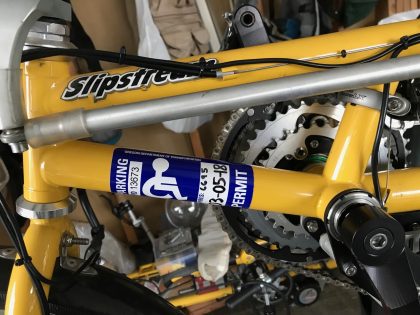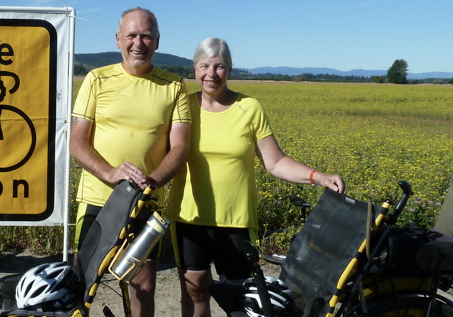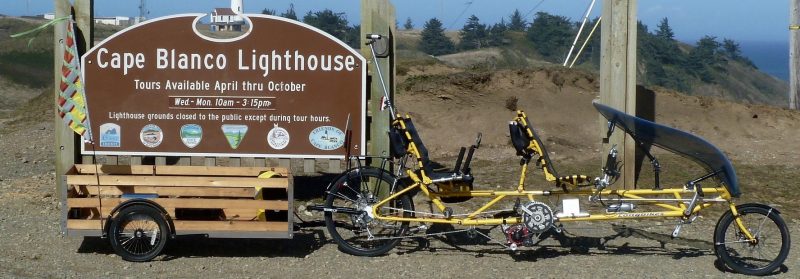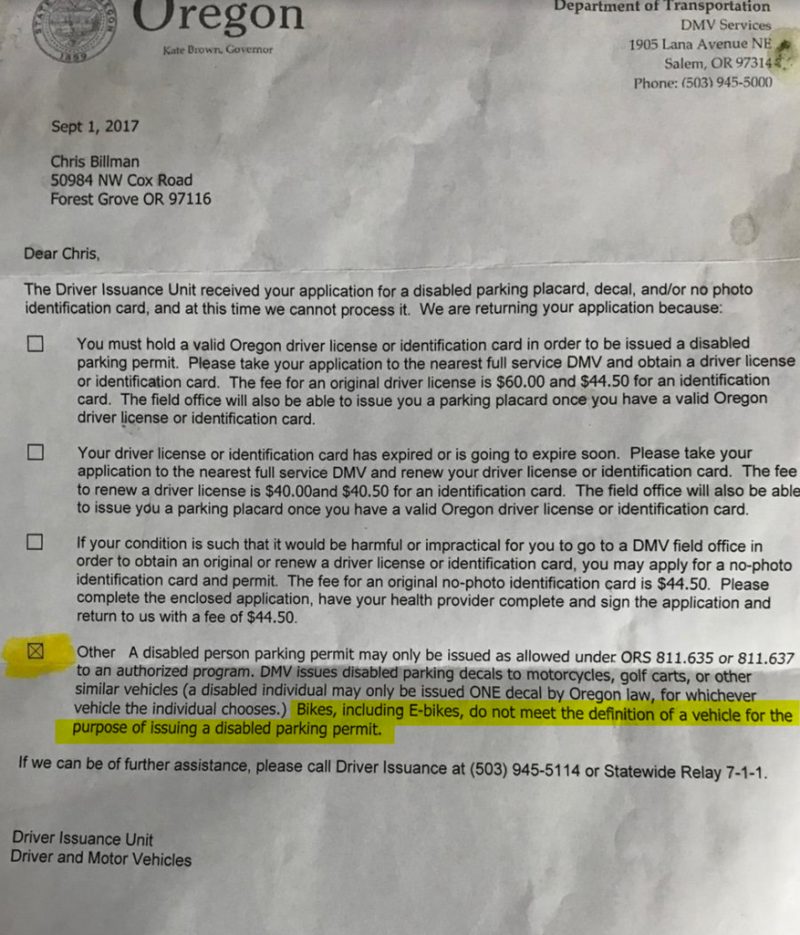
It’s not a bike, it’s a personal mobility device.
(Photos: Chris Billman)
61-year-old Forest Grove resident Chris Billman got a new lease on life when he discovered cycling.
He was born with scoliosis and suffers from a litany of degenerative issues including spinal stenosis and liver disease. He needs a cane to walk, and when he does, his legs can go numb.
But put his feet on pedals and everything changes.
Billman started riding years ago by putting upright “chopper” handlebars on a Schwinn 10-speed — a fine set-up for cruising around the neighborhood. Then in 2015 he invested in a recumbent and everything changed. “I was off and flying!” he told me during a phone call earlier this week in the voice of someone decades younger.
“They wanted to give me drugs, but the bicycle is better than opiates!”
— Chris Billman
“When I get on the bike I’m bent over like a pretzel,” he said. “But after I get on it my back is straight. If I can do that twice a week I’m in good shape. They wanted to give me drugs, but the bicycle is better than opiates!”
In fact they’re not just bicycles, they’re his personal mobility devices as defined by the federal Americans with Disabilities Act. Billman is currently the only Oregon resident with a disabled permit decal for his bicycle.
The bikes Billman rides are recumbents with electric-assist motors to make pedaling easier. His tandem Gulfstream (which he rides with his wife Barbara) is 17-feet long with the cargo trailer attached and his single-seat Slipstream is 12-feet long.

Chris and Barbara Billman.


But as the Billmans expanded their cycling horizons, they realized they weren’t welcome everywhere. A trip to ride carfree McKenzie Pass was met with a locked gate they couldn’t maneuver around without a struggle and damage to their bike. When they rolled up to the Banks-Vernonia Trail a sign greeted them with: “No motorized vehicles beyond this point.” And when they tried to run errands around town they quickly found that no bike racks on sidewalks could accommodate their relatively long vehicle.
“Why don’t they make it easier to get around that gate?”, “Why can’t I use that trail?”, “Why can’t I just park in a handicap parking stall?” Billman thought.
Given that his bikes are mobility devices and a mode of transportation, Billman wanted better access. No stranger to disability rights activism (he fought for more handicap parking at a City of Forest Grove parking lot in 2013), Billman began to research the issue.
He was able to guarantee his right to use the Banks-Vernonia State Trail by telling rangers his bicycle qualified as a mobility device under the American with Disabilities Act. Billman pointed out the section of the law that grants accces to “Other power-driven mobility devices” which are defined as, “any mobility device powered by batteries, fuel, or other engines… that is used by individuals with mobility disabilities for the purpose of locomotion, including golf cars, electronic personal assistance mobility devices… or any mobility device designed to operate in areas without defined pedestrian routes, but that is not a wheelchair.”
“The definition of an electric assisted bicycle can reasonably be described as being similar to a motorcycle.”
— David House, Oregon DMV
With federal law on his side and an impressive familiarity with the Oregon Revised Statutes (ORS), Billman turned his attention to the Department of Motor Vehicles (DMV).
In late 2015 Billman applied for an ADA decal for his bike. “It was like asking for a golden egg,” he shared. After a bit of back-and-forth where Billman said he “Had to throw around the ORS and OAR [Oregon Administrative Rules],” he eventually received it.
DMV spokesman David House recalled Billman’s case when we asked him about it last week. He says the decision has limited reach and doesn’t apply to all bicycles.
“We approved it by reasoning that since OAR [Oregon Administrative Rule] 735-080-0050(3) allows DMV to issue decals to ‘motorcycles, golf carts or other similar vehicles,’” House wrote in an email to BikePortland last week. “And the ORS 801.258 definition of an electric assisted bicycle can reasonably be described as being similar to a motorcycle.”
The DMV then issued this memo to Oregon law enforcement agencies in 2015:
“DMV has made a determination to issue disabled person parking decals to motorized recumbent bicycles and 3 or 4 wheel motorized mobility scooters for disabled individuals. Non-motorized recumbent bicycles are not qualified for the issuance of these decals. The decal numbers will reflect on the persons driving record for parking enforcement purposes.”
House made it clear to us that the DMV’s decision is only applicable to electric-assist recumbent bikes. “DMV does not issue ADA parking permits to bicycles.”
“We bought a badass bicycle, we decked it out, we’ve got a 50-amp motor and plenty of solar power… We can go anywhere.”
— Chris Billman
Billman’s first request set a precedent; but he wasn’t finished. A year later he began using a new recumbent and needed a second decal. Strangely, it was actually harder to get than the first one.
Oregon law allows for one disabled parking placard (the hanging ones that hook onto the rear-view mirror of a car) and one extra decal. When he got a new recumbent and requested a second decal, the DMV initially declined.
A rejection letter to Billman from the DMV’s Driver Issuance Unit in September 2017 stated that, “Bikes, including E-bikes, do not meet the definition of a vehicle for the purpose of issuing a disabled parking permit.” (It’s unclear why the DMV would state this, given the decision they made in 2015. We’ve asked David House for clarification and will update this post when we hear back.)
Billman claims he was also rebuffed in his request for a second decal at a local DMV office by a staff person who said he’d have to “Go down to Salem,” to take care of the problem.
Another DMV staffer told him last in October that he could only have one extra decal. “You will need to decide which bike you would like the decal to be placed on,” the staffer wrote in an email.
But Billman would not be denied.

If at first you don’t succeed…
“Your decision to force me into making a choice of what vehicle I would like the protection of the DMV/ADA decal on is uncalled for,” Billman replied. He felt the rules were biased in favor of people who drive automobiles. “The choice of having only one mobility device with an ADA decal is not forced on anyone else but the disabled whom don’t want to use a vehicle with registration fees attached to it,” Billman continued in a follow-up email.
Then he made his case using ORS 814.400, “Application of vehicle laws to bicycles”. “ORS 814.400 is clear in the first line the where it says the ‘same rights’,” Billman wrote. “And parking an oversized recumbent, pedal-assisted mobility device is not on the list [of exceptions]… Oregon ODOT receives funds from the Feds for ADA-related compliance, I think this is a clear ADA compliance issue… This is a quality-of-life dilemma you created and have forced me into,” he continued. “The stress from having to choose whether I want my one or two seat unit protected is uncalled for.”
Two months later, his second decal arrived in the mail.
Billman was please, but was also struck how the letter that accompanied the decal made no reference to the broader issues. “Nobody admitted anything. Nobody said, ‘Oh gosh, we’ve been denying people this right all alon. We’re not even sorry about it. We’re not even going to recognize that it happened. Here’s your sticker and go away.'”
“How many people just get denied and then give up?” Billman wondered.
Billman has the passion and persistence that are hallmarks of an effective advocate. And there are a lot of other things he’d like to change (like making bikeways fall under ADA regulations for quality and accessiblity). It’s all about accessibility and staying independent as long as possible.
“TriMet spends millions of dollars to send a little bus out to your house [referring to their Lift service], as long as you get in the wheelchair. But to me, it’s about staying out of the wheelchair. I don’t want to get into one! That’s not transportation — that’s keeping people more-or-less captive,” he shared with me in a phone cal. last week. “I’m a 61-year-old man who’s been independent all my life and now I have to call up someone 48 hours in advance to take me into town? Screw you! I don’t want it! We bought a badass bicycle, we decked it out, we’ve got a 50-amp motor and plenty of solar power… We can go anywhere.”
— Jonathan Maus: (503) 706-8804, @jonathan_maus on Twitter and jonathan@bikeportland.org
Never miss a story. Sign-up for the daily BP Headlines email.
BikePortland needs your support.
The post Chris Billman is the only Oregonian with a disabled parking decal for his bicycle appeared first on BikePortland.org.
from Latest headlines from BikePortland http://ift.tt/2CwopVc


No comments:
Post a Comment